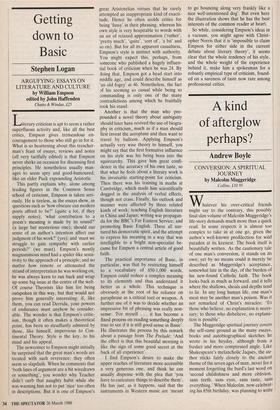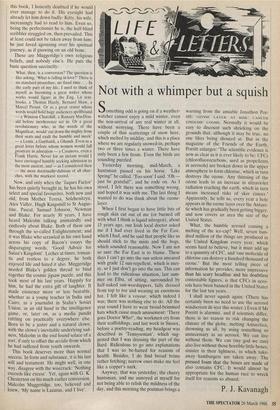A kind of afterglow perhaps?
Andrew Boyle
CONVERSION: A SPIRITUAL JOURNEY by Malcolm Muggeridge
Collins, f10.95
Whatever his over-critical friends might say to the contrary, this possibly final slim volume of Malcolm Muggeridge's life-story demands much more than a quick read. In some respects it is almost too complex to take in at one go, given the author's well-known predilection for wild paradox at its keenest. The book itself is beautifully written. As the cautionary tale of one man's conversion, it stands on its own; yet by no means could it merely be described as Muggeridge's acceptance, somewhat late in the day, of the burden of his new-found Catholic faith. The book looks back as much as forward, and it tells where the shallows, shoals and depths tend to lie. In any long human life, one man's meat may be another man's poison. Was it not remarked of Christ's miracles: 'To those who believe, no explanation is neces- sary; to those who disbelieve, no explana- tion is possible'.
The Muggeridge spiritual journey covers the self-same ground as the many essays, books and autobiographical sketches he wrote in his heyday, although from a fresher and more compressed angle. Like Shakespeare's melancholic Jaques, the au- thor sticks fairly closely to the ancient theme of the seven ages of man, never for a moment forgetting the bard's last word on `second childishness and mere oblivion, sans teeth, sans eyes, sans taste, sans everything.' When Malcolm, now celebrat- ing his 85th birthday, was planning to write this book, I honestly doubted if he would ever manage to do it. His eyesight had already let him down badly: Kitty, his wife, increasingly had to read to him. Even so, being the perfectionist he is, the half-blind scribbler struggled on, then prevailed. This at least could not be taken away from him; he just loved agonising over his spiritual journey, as if gnawing on an old bone.
These are Muggeridge's own religious beliefs, and nobody else's. He puts the basic question succinctly:
What, then, is a conversion? The question is like asking, 'What is falling in love?' There is no standard procedure, no fixed time .... In the early part of my life, I used to think of myself as becoming a great writer whose works would figure in the Eng. Lit text- books, a Thomas Hardy, Bernard Shaw, a Marcel Proust. Or as a great orator whose words would hold huge audiences spellbound — a Winston Churchill, a Ramsay MacDon- ald before incoherence set in. Or a great revolutionary who, in the words of the Magnificat, would 'cut down the mighty from their seats and exalt the humble and meek' — a Lenin, a Garibaldi, a Ghandi. Even as a great lover before whom women would fall prostrate in adoration — a Casanova, even a Frank Harris. Never for an instant would I have envisaged humbly seeking admission to the most ancient, and — as I considered then
— the most doctrinally, dubious of all chur- ches, with the murkiest record.
Now, and only when the 'Jaques Factor' has been quietly brought in, he has his own select and special favourites, both new and old, from Mother Teresa, Solzhenitzyn, Alex Vidler, Hugh Kingsmill to St Augus- tine, Pascal, Samuel Johnson, Newman and Blake. For nearly 30 years, I have heard Malcolm talking animatedly and endlessly about Blake. Both of them saw through the so-called Enlightenment; and it was Blake who scrawled in his own hand across his copy of Bacon's essays the disparaging words, 'Good Advice for Satan's Kingdom'. Lecher at times, roman- tic and restless to a degree, he both enjoyed life and hated it also. Muggeridge needed Blake's golden thread to bind together the cosmic jigsaw puzzle, and this took most of his last years. Happily for him, he had the extra gift of laughter. It made existence more or less bearable, whether as a young teacher in India and Cairo, as a journalist in Stalin's Soviet Union, as an old hand in the intelligence game, or, later on, as a media pundit rattling on practically everywhere else. Born to be a jester and a natural clown, with the clown's inevitable underlying sad- ness, Malcolm in the end found solace of a sort, if only to offset the accidie from which he had suffered from youth onwards. This book deserves more than normal success. In form and substance, it is his last will and testament. He might well, in one way, disagree with the wisecrack: 'Nothing exceeds like excess'. Yet, again with G. K. Chesterton on his much earlier conversion, Malcolm Muggeridge, too, believed and knew, 'My name is Lazarus, and I live'.



















































 Previous page
Previous page